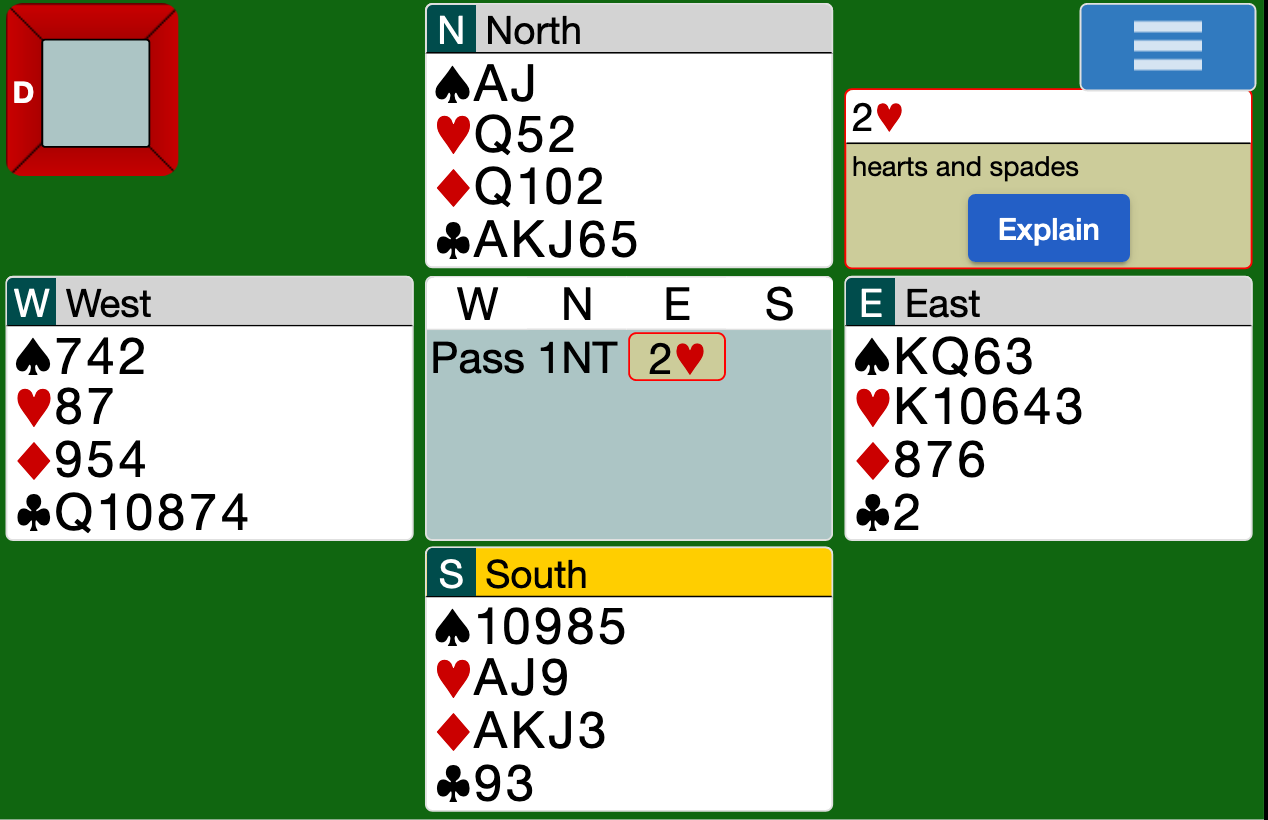Once you discover the magic of Jacoby Transfer Bids, it's hard to give them up!
By default, Jacoby Transfers are OFF when the opponents interfere with any bid other than 2♣. The Stayman convention has long specified that after an interfering 2♣ bid a double (X) is used to ask partner for a 4-card major suit.
Why not do the same for all of the other intervening bids as well? 1NT - 2♦ - X as a transfer to hearts, 1NT - 2♥ - X as a transfer to spades, 1NT - 2♠ - X as a relay to the minors.
The "stolen bid double" caught on like wildfire, especially among intermediate players. As I began playing with more experienced partners, I discovered that none of them used the stolen bid double!
There's a very good reason for this: it takes away the ability to punish bad overcalls when responder has a really good hand. Have a look at this hand from the Endless Summer online regional this past weekend:

East is using the DONT system where his 2♥ bid shows both hearts and spades. You can see how ratty his hand and suits are! This is a call that badly needs to be punished with a penalty double.
With both sides vulnerable, N-S might easily set 2♥ (or 2♠) three tricks for an 800 score, besting 3NT making 600-something.
What actually happened at the table is that South doubled for penalty, but North pulled the double thinking it was intended as a "stolen bid double" by bidding 2♠. The auction proceeded with South bidding 3NT. Luckily North had only a doubleton spade, so it played in 3NT, making 5 for 660.
This was a new partnership, so it's not an unreasonable mix-up. It does however outline the reasons why stolen bid doubles are a bad idea.
Normally when a double is assigned an alternate meaning, that is, it's intended to be "taken out," there needs to be some means for the partnership to recover a penalty double when it's called for.
If your partner is in a context where he might make a conventional (takeout) double, and partner fails to double, it's usually up to you to struggle to find a "reopening" double that will give partner the opportunity to pass for penalty if that was his intention. Negative doubles come to mind as the most common circumstance where responder might want to punish a bad overcall, and a reopening double is important if you're anywhere close to the right shape.
If opener started the auction with 1NT, they have generally described their hand so completely that responder is clearly captain of the hand. If responder passes in a situation where they could have made a stolen bid double, it's almost inconceivable for opener to justify reopening with a double. Opener might compete with a five card suit, if their hand has one, but doubling usually suggests shortness in the opponent's suits. A 1NT opener isn't supposed to have much in the way of shortness.
Adopting stolen bid doubles means it becomes impossible to double for penalty. That is too steep a price to pay to retain Jacoby Transfers! Bid your five-card (unbid) majors naturally, and play the hand from responder's side. Another way to compete after an overcall of 1NT is the Lebensohl convention -- which is horribly complex, and I'm recommending it only for fanatics.
Here's a final point to consider: If your right-hand opponent opens a strong (15-17) 1NT, take a look at their card and see if they marked "Stolen Bid" in their Notrump Openings box. (It's required to be there, and be alerted!)
If they play stolen bid doubles, you can freely overcall on almost anything! Your opponents have no way to punish you with a penalty double!
